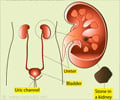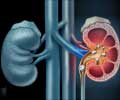What is creatinine?
It is one of the waste products in the body that comes from the normal wear and tear of muscles. The ‘normal’ level of serum creatinine is dependent on multiple factors like age, gender, body size, muscle mass etc. The best way to know the function of the kidneys is to know the glomerular filtration rate(GFR). GFR is a calculation based on age, gender, and weight(
1✔).
Serum or bloodstream creatinine is not the same as creatinine clearance, the amount excreted by the urine. The result shows how much creatinine has passed through your kidneys into your urine. It helps show how well your kidneys are removing waste products from your blood and is one of the ways of estimating GFR(
2✔).
The creatinine clearance test provides some information about kidney function. Creatinine is freely filtered across the glomerulus( kidney filters) and is not reabsorbed or metabolized in the tubules(
3✔).
It is however secreted by some pathways in the tubules and this accounts for 10-20% of the urine creatinine in healthy individuals. Therefore, it may overestimate the GFR by 10 %. The test helps diagnose kidney dysfunction and the presence of a significant kidney problem(
4✔).
The creatinine clearance in healthy adults is 80-120 ml/min.
The test compares the levels of creatinine in the urine and the blood. Urine and blood samples are needed to perform the test.
If there is any abnormality in the functioning of the kidneys, the level of creatinine in blood increases because less creatinine is released through the urine.
Certain drugs such as aminoglycosides, cimetidine, cisplatin, and cephalosporins can lower creatinine clearance measurements(
5✔).
Whereas diuretics (water pills that help the body get rid of salt and water) can increase creatinine clearance values(
6✔).
A 24-hour urine collection is done by collecting your urine in a special container over a full 24-hour period. The container must be kept cool until the urine is returned to the lab.It can be done on an outpatient basis. It can start at any time of the day, but it may be more convenient to start early morning. The first urine void is emptied, and then from then on, all the urine samples are collected in the bottle untill the next morning’s first void(
7✔).
The creatinine clearance is measured in milliliters per minute (ml/min).
 MEDINDIA
MEDINDIA
 Email
Email
















